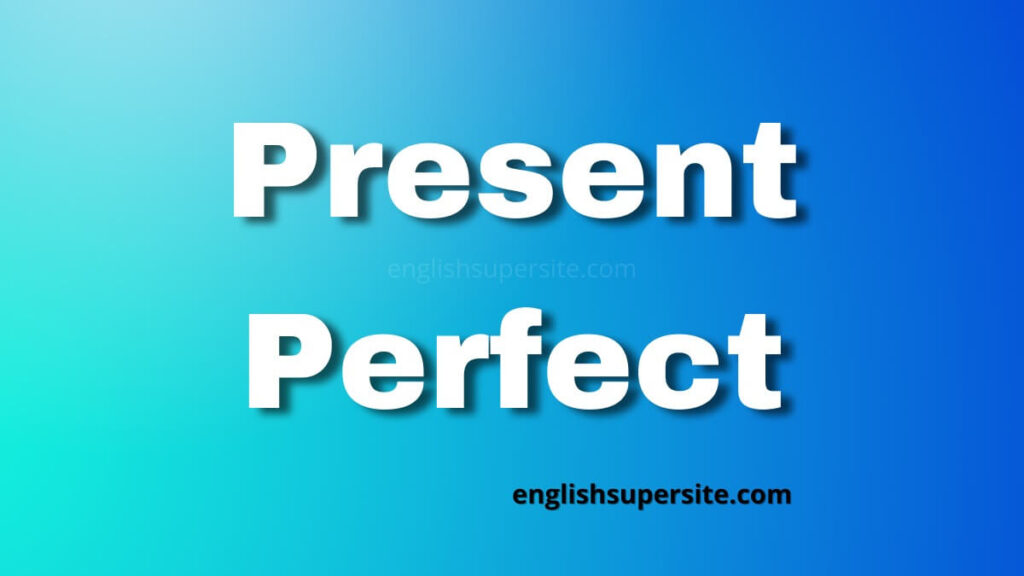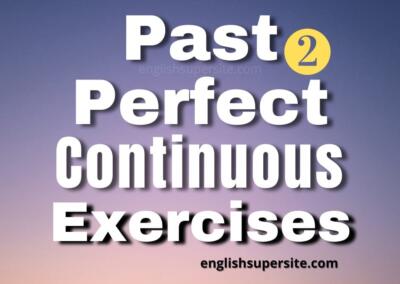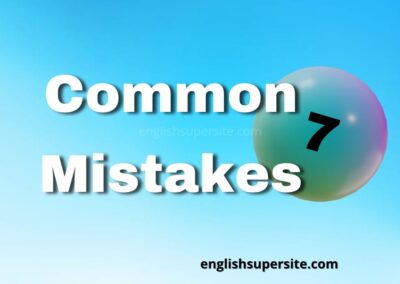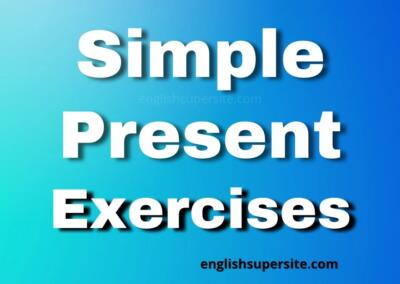
Present Perfect
Sometimes called Simple Present Perfect, the Present Perfect is one of the Verb Tenses associated with the Present Tense in English.
We use Present Perfect to express that an action or something has happened in the past and it has a connection to the present, there is a connection with now. The action in the past has a result now. The exact time is not important.
We also use it to express an action that happened at an unspecified time.
Quick Example
- You have studied English enough.
- You have not studied English enough.
- Have you studied English enough?
Form
| I – you – we – you – they | he – she – it |
|---|---|
| Regular verbs: have + verb (past participle)* Irregular verbs: have + verb (past participle)** | Regular verbs: has + verb (past participle)* Irregular verbs: has + verb (past participle)** |
*Pronouncing “ed” at the end of words
**List of Irregular Verbs
Common Signal Words
- Already
- Once
- Several times
- Before
- Yet
- Just
- Never
- Ever
- So far
- Up to now
- Since
- For
- Recently
- Many times
Use
The Present Perfect is a verb tense used to express:
- An action that happened at an unspecified time
- Actions that have recently occurred
- An action or something has happened in the Past and it has a connection to the Present
- Actions that have happened repeatedly before now
- An Experience
1. An action that happened at an unspecified time
- I think I have met him a couple times before.
- Nobody has ever taught me this topic before.
- Nobody has every climbed that mountain all the way to the top.
- Have you read this book yet?
- Susan has not finished her homework yet.
- The rain has finally stopped we can go now.
- The rain hasn’t stopped yet.
2. Actions that have recently occurred
- I have just had lunch.
- I am sorry, I have forgotten your name.
- There has been a huge party at the Company.
- He has just gone to sleep.
- She has had a baby boy.
- She has just had a baby boy.
3. An action or something has happened in the Past and it has a connection to the Present
- I can’t go to work because I have broken my leg.
- We have spoken English with the Officer, to explain the incident.
- Mary has lived in London all her life.
- I have been waiting for you for over an hour.
- I have been here since Friday.
- He has lost his passport.
- She has bought a new car.
- How long have you known Mark?
- I have known Mark for three years.
- I have known him for a long time.
4. Actions that have happened repeatedly before now
- He has failed this test three times.
- We have flown across Europe two times.
- We have had several problems while working on this project.
- I have had two cups of coffee today already.
5. An Experience
- Have you ever been to Italy?
- Have you been to Italy in the last year?
- I haven’t been to the United States.
- I have been to Japan.
- She has been to Portugal several times.
- Mark has studied five foreign languages.
- Antony has never traveled by plane.
- She has never climbed a mountain.
- I think I have never listened to that song.
- I have never seen this such a beautiful movie before.
NOTE:
Please note the difference between been and gone.
- She is in Canada now: She has gone to Canada on vacation.
- She went to Canada and came back: She has been to Canada on vacation.
Study Also:
Examples
Present Perfect using Work (Regular Verb)
| Affirmative | Negative | Interrogative |
|---|---|---|
| I have worked. | I haven’t worked. | Have I worked? |
| You have worked. | You haven’t worked. | Have you worked? |
| He has worked. | He hasn’t worked. | Has he worked? |
| She has worked. | She hasn’t worked. | Has she worked? |
| It has worked. | It hasn’t worked. | Has it worked? |
| You have worked. | You haven’t worked. | Have you worked? |
| We have worked. | We haven’t worked. | Have we worked? |
| They have worked. | They haven’t worked. | Have they worked? |
Present Perfect using Go (Irregular Verb)
| Affirmative | Negative | Interrogative |
|---|---|---|
| I have gone. | I haven’t gone. | Have I gone? |
| You have gone. | You haven’t gone. | Have you gone? |
| He has gone. | He hasn’t gone. | Has he gone? |
| She has gone. | She hasn’t gone. | Has she gone? |
| It has gone. | It hasn’t gone. | Has it gone? |
| You have gone. | You haven’t gone. | Have you gone? |
| We have gone. | We haven’t gone. | Have we gone? |
| They have gone. | They haven’t gone. | Have they gone? |
Present Perfect using Study (Regular Verb)
| Affirmative | Negative | Interrogative |
|---|---|---|
| I have studied. | I haven’t studied. | Have I studied? |
| You have studied. | You haven’t studied. | Have you studied? |
| He has studied. | He hasn’t studied. | Has he studied? |
| She has studied. | She hasn’t studied. | Has she studied? |
| It has studied. | It hasn’t studied. | Has it studied? |
| You have studied. | You haven’t studied. | Have you studied? |
| We have studied. | We haven’t studied. | Have we studied? |
| They have studied. | They haven’t studied. | Have they studied? |
Study Also:
Abbreviations Cohesion and Coherence Collocations Comparative Conditionals Frequent Errors Future Continuous Future Perfect Future Perfect Continuous Future Simple Homonyms Interjections Journaling Learn English Linking Words Logical Flow Past Continuous Past Perfect Past Perfect Continuous Past Simple Plural Present Continuous Present Perfect Present Perfect Continuous Present Simple Pronunciation Question Tags Quiz Quotes Simple Future Simple Past Simple Present Spelling Superlative Transition Words
Share with your friends!






